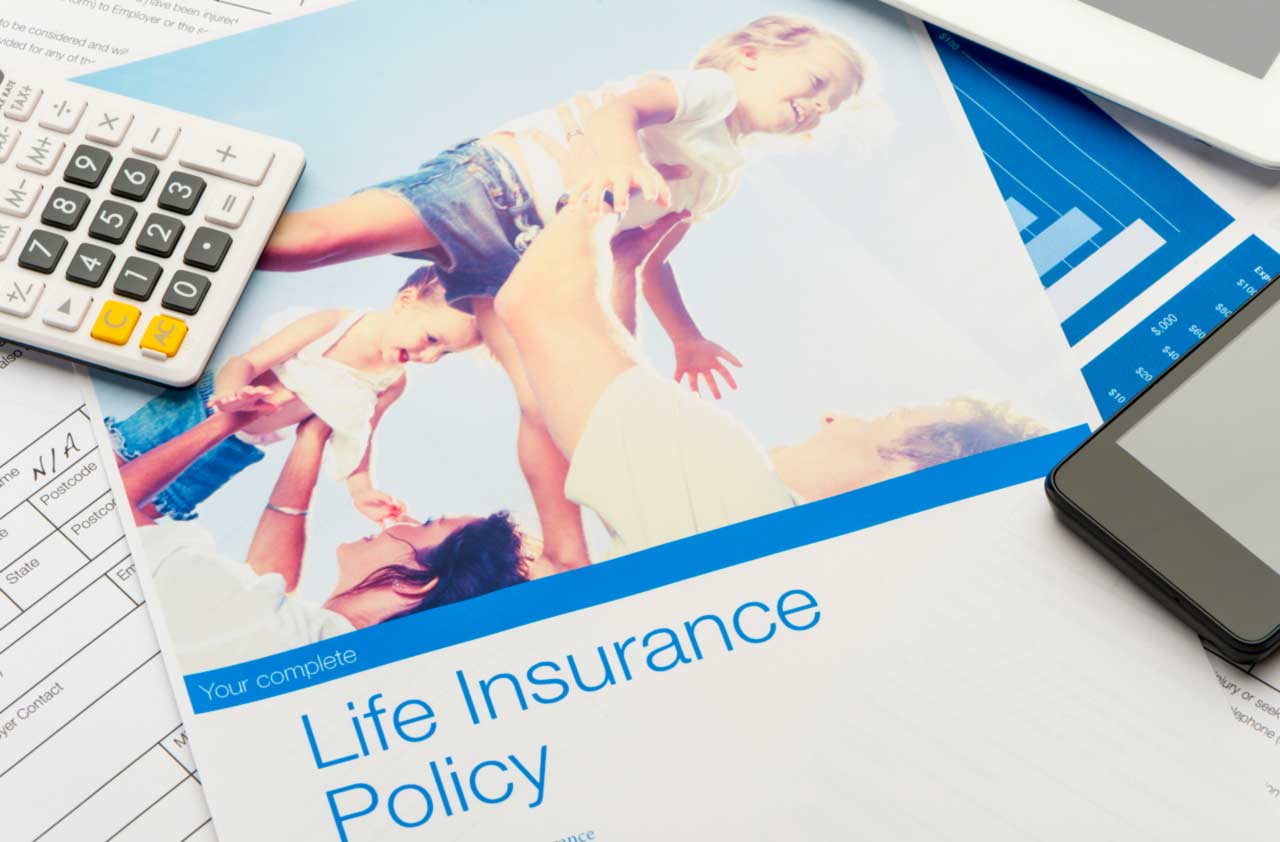Does Life Insurance Deserve a Place in Your Retirement Portfolio?
For many people, it could be worth looking into. But make sure you understand the pros and cons, what you’re paying and what you’re getting for that money.


Profit and prosper with the best of Kiplinger's advice on investing, taxes, retirement, personal finance and much more. Delivered daily. Enter your email in the box and click Sign Me Up.
You are now subscribed
Your newsletter sign-up was successful
Want to add more newsletters?

Delivered daily
Kiplinger Today
Profit and prosper with the best of Kiplinger's advice on investing, taxes, retirement, personal finance and much more delivered daily. Smart money moves start here.

Sent five days a week
Kiplinger A Step Ahead
Get practical help to make better financial decisions in your everyday life, from spending to savings on top deals.

Delivered daily
Kiplinger Closing Bell
Get today's biggest financial and investing headlines delivered to your inbox every day the U.S. stock market is open.

Sent twice a week
Kiplinger Adviser Intel
Financial pros across the country share best practices and fresh tactics to preserve and grow your wealth.

Delivered weekly
Kiplinger Tax Tips
Trim your federal and state tax bills with practical tax-planning and tax-cutting strategies.

Sent twice a week
Kiplinger Retirement Tips
Your twice-a-week guide to planning and enjoying a financially secure and richly rewarding retirement

Sent bimonthly.
Kiplinger Adviser Angle
Insights for advisers, wealth managers and other financial professionals.

Sent twice a week
Kiplinger Investing Weekly
Your twice-a-week roundup of promising stocks, funds, companies and industries you should consider, ones you should avoid, and why.

Sent weekly for six weeks
Kiplinger Invest for Retirement
Your step-by-step six-part series on how to invest for retirement, from devising a successful strategy to exactly which investments to choose.
Most people don’t like to talk about life insurance.
They might acknowledge that it’s a necessity — especially when their kids are still young. But few look beyond the traditional payout of death benefits. They don’t necessarily think of life insurance as an asset for their own future; it’s more about helping to provide financial protection for their loved ones when they’re gone.
But life insurance products have evolved over the years, and the benefits and protections go much further than many know. The right policy could play an important part in your overall retirement plan, so it’s worth doing a little research.
From just $107.88 $24.99 for Kiplinger Personal Finance
Become a smarter, better informed investor. Subscribe from just $107.88 $24.99, plus get up to 4 Special Issues

Sign up for Kiplinger’s Free Newsletters
Profit and prosper with the best of expert advice on investing, taxes, retirement, personal finance and more - straight to your e-mail.
Profit and prosper with the best of expert advice - straight to your e-mail.
The different types of policies
Policies are usually categorized as either term or permanent insurance. Term is just what you’d think: It’s a set amount of insurance for a set term.
Permanent insurance is a little more complicated. It comes in all shapes and sizes. Here are some of the basics:
- Whole life is the most common type of permanent insurance, according to the Insurance Information Institute. It offers lifelong protection — as long as your premiums are paid — as well as a savings component in the form of cash value accumulation. In addition, there may also be a dividend the company could pay out based on its performance from year to year. A downside is that these policies can have high premiums — and the dividend payment isn’t guaranteed. Premiums vary widely, depending on your age, health and the amount of coverage you want.
- Universal life also combines lifelong protection with a savings component. Both the death benefit and premiums can be flexible, subject to certain minimums and maximums. Premiums first go to pay the death benefit and policy expenses. Any remaining premium goes into the cash value, where it is credited with a rate of interest determined by the insurer, but guaranteed not to be less than a certain amount.
- Variable universal life is structured similar to universal life, except it’s typically tied to a set of investments — which the policyholder generally gets to choose. The cash value of a variable life policy is not guaranteed. If your contract’s investments do not perform well, your cash value and death benefit may decrease, and the policy could eventually lapse.
- Indexed universal life is also structured similar to universal life, but interest credits are linked to a market index (for example, the S&P 500). There’s usually a cap on how much interest is credited to the policy’s cash value, but if the market goes down, your principle is protected by a guaranteed minimum interest rate or floor.
Life insurance pros
Some of these insurance policies also offer riders, typically at an additional cost, that enable you to receive accelerated death benefits if you have a terminal or chronic illness or face expensive long-term care costs. Note that any benefits paid out will be subject to eligibility requirements and will reduce the policy’s death benefit. This can be a powerful option, designed to help meet the needs of retirees, who are living longer than past generations.
Consumers are a little more familiar with the cash value benefits of permanent life insurance policies. The IRS tax code has allowed for life insurance cash values and death benefit proceeds to receive tax advantages that are unique. Death benefits generally are income tax-free, and the money inside the policy grows income tax-deferred, and is tax-free when you take it out in the form of a policy loan.
In addition, there are no contribution limits (other than the guidelines set by the issuing insurance company), you don’t have to leave the money in for a certain amount of time before accessing it, and there’s no IRS tax penalty for taking it before you turn 59½.
Things to watch out for
Those are positives, but there definitely are some things to look out for when you’re choosing your life insurance policy. So make sure you ask about:
- Costs and fees: Before buying a life insurance policy, be sure you understand the policy charges and fees. Insurance companies will deduct some industry-standard fees, and other costs can vary. Be sure the money you’re putting in isn’t being swallowed up by these fees.
- Loan rates: When considering taking a policy loan from your life insurance contract, it’s important to understand the terms and conditions. Most policy loans include interest rate charges. Although you are not required to pay back the loan, it’s important to keep in mind that accessing the cash value through policy loans will reduce available cash values and death benefits and may cause the policy to lapse. In the event of a lapse, outstanding policy loans in excess of the unrecovered cost basis will be subject to ordinary income tax.
- Cap rate: If you choose an indexed universal life contract, I recommend shopping for the highest cap you can get. It’s potentially more money in your pocket if the index performs favorably.
- Stability: Make sure the insurance company you choose is financially stable, as the guarantees and protections provided by life insurance products are backed by the financial strength and claims-paying ability of the issuing insurance carrier. You can search www.ambest.com to see how various companies are rated, or contact your state insurance department.
- Reliability: It is important to appropriately fund your policy so it doesn’t lapse. Some policies offer a no-lapse guarantee rider — this feature may come at an additional cost.
Every type of life insurance has its own pros and cons. Don’t overlook the benefits these policies have to offer — but don’t hesitate to ask questions or to talk to your financial professional about finding the appropriate fit for your overall retirement plan. To help ensure you’re getting unbiased advice about insurance policies and premiums, work with a financial adviser who is held to the fiduciary standard.
Kim Franke-Folstad contributed to this article.
Investment advisory services offered through Wall Street Financial Group Inc. and AE Wealth Management LLC (AEWM). Wall Street Financial Group Inc. and AEWM are not affiliated companies.
Investment advisory services offered only by duly registered individuals through AE Wealth Management, LLC (AEWM). Rooted Wealth Retirement and AEWM are not affiliated companies.
Profit and prosper with the best of Kiplinger's advice on investing, taxes, retirement, personal finance and much more. Delivered daily. Enter your email in the box and click Sign Me Up.

Zach Gray is an Investment Adviser Representative and founder of Rooted Wealth Advisors. He holds Series 6, 63 and 65 securities registrations as well as property/casualty and life/health insurance licenses in Illinois, Indiana and Missouri. He recently earned his Chartered Retirement Planning Counselor designation from the College of Financial Planning.
-
 Dow Leads in Mixed Session on Amgen Earnings: Stock Market Today
Dow Leads in Mixed Session on Amgen Earnings: Stock Market TodayThe rest of Wall Street struggled as Advanced Micro Devices earnings caused a chip-stock sell-off.
-
 How to Watch the 2026 Winter Olympics Without Overpaying
How to Watch the 2026 Winter Olympics Without OverpayingHere’s how to stream the 2026 Winter Olympics live, including low-cost viewing options, Peacock access and ways to catch your favorite athletes and events from anywhere.
-
 Here’s How to Stream the Super Bowl for Less
Here’s How to Stream the Super Bowl for LessWe'll show you the least expensive ways to stream football's biggest event.
-
 How to Add a Pet Trust to Your Estate Plan: Don't Leave Your Best Friend to Chance
How to Add a Pet Trust to Your Estate Plan: Don't Leave Your Best Friend to ChanceAdding a pet trust to your estate plan can ensure your pets are properly looked after when you're no longer able to care for them. This is how to go about it.
-
 Want to Avoid Leaving Chaos in Your Wake? Don't Leave Behind an Outdated Estate Plan
Want to Avoid Leaving Chaos in Your Wake? Don't Leave Behind an Outdated Estate PlanAn outdated or incomplete estate plan could cause confusion for those handling your affairs at a difficult time. This guide highlights what to update and when.
-
 I'm a Financial Adviser: This Is Why I Became an Advocate for Fee-Only Financial Advice
I'm a Financial Adviser: This Is Why I Became an Advocate for Fee-Only Financial AdviceCan financial advisers who earn commissions on product sales give clients the best advice? For one professional, changing track was the clear choice.
-
 I Met With 100-Plus Advisers to Develop This Road Map for Adopting AI
I Met With 100-Plus Advisers to Develop This Road Map for Adopting AIFor financial advisers eager to embrace AI but unsure where to start, this road map will help you integrate the right tools and safeguards into your work.
-
 The Referral Revolution: How to Grow Your Business With Trust
The Referral Revolution: How to Grow Your Business With TrustYou can attract ideal clients by focusing on value and leveraging your current relationships to create a referral-based practice.
-
 This Is How You Can Land a Job You'll Love
This Is How You Can Land a Job You'll Love"Work How You Are Wired" leads job seekers on a journey of self-discovery that could help them snag the job of their dreams.
-
 65 or Older? Cut Your Tax Bill Before the Clock Runs Out
65 or Older? Cut Your Tax Bill Before the Clock Runs OutThanks to the OBBBA, you may be able to trim your tax bill by as much as $14,000. But you'll need to act soon, as not all of the provisions are permanent.
-
 The Key to a Successful Transition When Selling Your Business: Start the Process Sooner Than You Think You Need To
The Key to a Successful Transition When Selling Your Business: Start the Process Sooner Than You Think You Need ToWay before selling your business, you can align tax strategy, estate planning, family priorities and investment decisions to create flexibility.